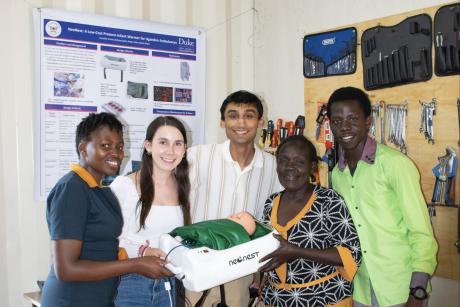
From left: Rony Meza, Honduras/Engineering World Health; Justin Cooper, Honduras/Engineering World Health; Moitreyee Sinha, GE Foundation; David Chavez, INFOP.
Published November 27, 2012, last updated on February 18, 2013
Engineering World Health (EWH) and the GE Foundation have signed an agreement with Instituto Nacional de Formacion Profesional (INFOP) in Honduras that lays the foundation for expansion of the BMET Training Program. Since 2010, EWH and Duke University have led a continuing education program for biomedical equipment technicians from 12 public hospitals in Honduras. The agreement represents a move toward sustainability in that the program will be locally managed and operated.
The three-party agreement establishes a new field of training in Honduras and will offer an intensive, full-time training program for hands-on medical equipment repair and maintenance. INFOP will also create an independent academic department with three full-time faculty members and construct laboratory facilities to support the program at its campus in Tegucigalpa. The training will be led by the Honduran public sector through INFOP, with the first group of students beginning study in February.
The BMET training curriculum was developed by Robert Malkin’s Developing World Healthcare Technology lab, with help from undergraduate students at the Duke Pratt School of Engineering. A similar training program has been tailored for use in Ghana, Rwanda and Cambodia.
“We know this training works, and ultimately benefits patients,” said Malkin. “In Rwanda, for example, technicians trained using this approach have nearly 50% less out-of-service medical equipment in their hospitals than technicians who did not receive the training. We’ve been honored to play a role in building capacity for this training in Honduras and are delighted our partners will continue managing it for the long-term.”
Malkin’s research team has shown that with more functioning medical equipment, there’s fewer wait times for surgery, more treatments available for premature infants and more accurate patient diagnosis. With more research, Malkin says the training program could possibly lead to lower hospital mortality rates.
For more info about the agreement, visit the BMET website.


